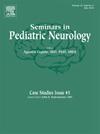亚急性硬化性全脑炎
IF 2.1
4区 医学
Q2 CLINICAL NEUROLOGY
引用次数: 0
摘要
亚急性硬化性全脑炎(SSPE)是一种毁灭性的神经退行性疾病,由于神经系统持续突变,野生麻疹病毒感染。虽然急性感染通常是自限性的,但有缺陷的病毒清除可导致神经毒性毒株的出现,这些毒株在宿主内发生突变,逃避免疫监视,建立慢性中枢神经系统(CNS)感染。它主要影响儿童和年轻人,尽管没有年龄,包括婴儿,对SSPE免疫。特征性神经学表现包括进行性行为和认知能力下降、神经运动障碍、肌阵挛、植物人状态和诊断后1-3年内死亡,尽管少数患者有长期稳定和自发消退的报道。尽管全球努力消除麻疹,但由于疫苗覆盖率不足,SSPE在低收入和中等收入国家仍然是一个具有挑战性的问题。有限的卫生基础设施、不理想的监测和有限的诊断测试的可用性阻碍了早期诊断和管理,使SSPE成为公共卫生危机。在疫苗接种计划发达的高收入国家,麻疹暴发通常是由于国际旅行、移民和疫苗犹豫,使其成为一个全球性问题。缺乏有效的抗病毒治疗使得支持性和姑息治疗成为SSPE确诊后的主要治疗策略。最近的研究强调了潜在的治疗策略,针对突变麻疹病毒的新分子方法,以及加强公共卫生措施以控制疫情。然而,在麻疹流行和SSPE高疾病负担的中低收入国家,这些仍然很大程度上无法获得。需要采取紧急行动,通过加强疫苗接种规划、实施早期诊断战略和提高新兴治疗方法的可及性来弥合这一差距。目前的综述讨论了SSPE的各个方面,以及与LMIC相关的SSPE预防策略的重要性。如果没有全面的努力和多管齐下的方法来消除麻疹和预防SSPE,该疾病将仍然是一个全球威胁。本文章由计算机程序翻译,如有差异,请以英文原文为准。
Subacute sclerosing panencephalitis
Subacute sclerosing panencephalitis (SSPE) is a devastating neurodegenerative disorder due to a persistent mutated, wild-measles virus infection of the nervous system. While the acute infection is generally self-limiting, defective viral clearance can lead to the emergence of neurovirulent strains that undergo mutations within the host, evade immune surveillance, establishing chronic central nervous system (CNS) infection. It predominantly affects children and young adults although no age, including infants, is immune to SSPE. The characteristic neurological manifestations include progressive behavioral and cognitive decline, neuromotor impairment, myoclonus, vegetative state and death within 1-3 years of diagnosis, although prolonged stabilization and spontaneous resolution have been reported in a minority of patients. Despite global efforts towards measles elimination, SSPE remains a challenging problem in the low- and middle-income countries (LMICs) due to inadequate vaccine coverage. Limited health infrastructure, suboptimal surveillance, and limited availability of diagnostic tests hinders early diagnosis and management making SSPE a public health crisis. The measles outbreaks in high-income countries with developed vaccination programs are commonly due to international travel, immigration, and vaccine hesitancy, making it a global problem. The lack of effective antiviral therapy makes supportive and palliative care the primary management strategy once SSPE is confirmed. Recent research highlights potential therapeutic strategies, novel molecular approaches targeting mutant measles viruses, and enhanced public health measures to contain the outbreaks. However, these remain largely inaccessible in LMICs with measles endemicity and the high disease burden of SSPE. Urgent action is needed to bridge this gap by strengthening vaccination programs, implementing early diagnostic strategies, and enhancing access to emerging treatments. The current review discusses the various aspects of SSPE and the importance of preventive strategies for SSPE as relevant to LMIC. Without holistic efforts and a multi-pronged approach to eliminate measles and prevent SSPE, the disease shall remain a global threat.
求助全文
通过发布文献求助,成功后即可免费获取论文全文。
去求助
来源期刊

Seminars in Pediatric Neurology
CLINICAL NEUROLOGY-PEDIATRICS
CiteScore
4.80
自引率
0.00%
发文量
38
审稿时长
84 days
期刊介绍:
Seminars in Pediatric Neurology is a topical journal that focuses on subjects of current importance in the field of pediatric neurology. The journal is devoted to making the status of such topics and the results of new investigations readily available to the practicing physician. Seminars in Pediatric Neurology is of special interest to pediatric neurologists, pediatric neuropathologists, behavioral pediatricians, and neurologists who treat all ages.
 求助内容:
求助内容: 应助结果提醒方式:
应助结果提醒方式:


